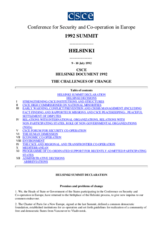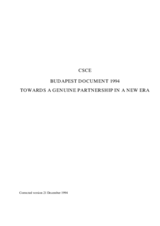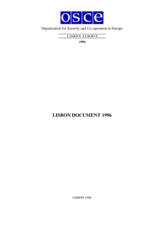-
Our work
-
Fields of work
- Arms control
- Border management
- Combating trafficking in human beings
- Conflict prevention and resolution
- Countering terrorism
- Cyber/ICT Security
- Democratization
- Economic activities
- Education
- Elections
- Environmental activities
- Gender equality
- Good governance
- Human rights
- Media freedom and development
- Migration
- National minority issues
- Policing
- Reform and co-operation in the security sector
- Roma and Sinti
- Rule of law
- Tolerance and non-discrimination
- Youth
- Field operations
- Projects
-
Meetings and conferences
- Summit meetings
- Review Conferences
- Ministerial Council meetings
- Plenary meetings of the Permanent Council
- Plenary Meetings of the Forum for Security Co-operation
- Security Review Conferences
- Annual Implementation Assessment Meetings
- Economic and Environmental Forum
- Economic and Environmental Dimension Implementation Meetings
- Human rights meetings
- Media conferences
- Cyber/ICT security conferences
- Conference of the Alliance against Trafficking in Persons
- Gender equality conferences
- Annual OSCE Mediterranean conferences
- Annual OSCE Asian conferences
- Partnerships
-
Fields of work
-
Countries
- All
-
Participating States
- Albania
- Andorra
- Armenia
- Austria
- Azerbaijan
- Belgium
- Belarus
- Bosnia and Herzegovina
- Bulgaria
- Canada
- Croatia
- Cyprus
- Czechia
- Denmark
- Estonia
- Finland
- France
- Georgia
- Germany
- Greece
- Holy See
- Hungary
- Iceland
- Ireland
- Italy
- Kazakhstan
- Kyrgyzstan
- Latvia
- Liechtenstein
- Lithuania
- Luxembourg
- Malta
- Moldova
- Monaco
- Mongolia
- Montenegro
- The Netherlands
- North Macedonia
- Norway
- Poland
- Portugal
- Romania
- Russian Federation
- San Marino
- Serbia
- Slovakia
- Slovenia
- Spain
- Sweden
- Switzerland – OSCE Chairpersonship 2026
- Tajikistan
- Türkiye
- Turkmenistan
- Ukraine
- United Kingdom
- United States of America
- Uzbekistan
- Asian Partners for Co-operation
- Mediterranean Partners for Co-operation
-
Structures and institutions
- Chairpersonship
-
Secretariat
- Secretary General
- Office of the Secretary General
- Conflict Prevention Centre
- Transnational Threats Department
- Office of the Special Representative and Co-ordinator for Combating Trafficking in Human Beings
- Office of the Co-ordinator of OSCE Economic and Environmental Activities
- Gender Issues Programme
- Opportunities for Youth
- Department of Human Resources
- Department of Management and Finance
- Office of Internal Oversight
- Documentation Centre in Prague
- Institutions
-
Field operations
- Presence in Albania
- Centre in Ashgabat
- Programme Office in Astana
- Programme Office in Bishkek
- Mission to Bosnia and Herzegovina
- Programme Office in Dushanbe
- Mission in Kosovo
- Mission to Moldova
- Mission to Montenegro
- Mission to Serbia
- Mission to Skopje
- Project Co-ordinator in Uzbekistan
- Closed field activities
- Parliamentary Assembly
- Court of Conciliation and Arbitration
- Organizational structure
- About us
Overview
The Forum’s mandate and mission
The Forum for Security Co-operation is the OSCE’s key platform for matters in the politico-military dimension, where the 57 participating States work together to increase military security and stability in the Euro-Atlantic and Eurasian areas. Its establishment, mandate and successive mandate extensions were decided upon at some of the foundational CSCECSCE
Conference on Security and Co-operation in Europe/OSCE meetings in the 1990s and early 2000s.
Towards a Genuine Partnership in a New Era
6 December 1994
The Budapest Document 1994 considerably enlarged the Forum’s responsibilities, with the States tasking it, among other things, to develop a framework for arms control, “including goals and methods for building, maintaining and improving stability and security in the CSCE region”.
Lisbon Document
3 December 1996
With the Lisbon Document 1996, the participating States decided to give the Forum a new work programme, including developing “a web of arms control agreements” and addressing regional issues, for example by looking “at ways at making more effective use of its decision on ‘Stabilizing Measures for Localized Crisis Situations’.
Consolidated References to the Mandates
Consolidated References to the OSCE Forum for Security Co-operation Mandates, 1 June 2022
Agreements and commitments
Vienna Document and Code of Conduct
A set of mutually reinforcing and interlocking agreements and related information exchanges underpin the OSCE’s approach to military transparency and openness. A central document in this context is the Vienna Document, which is a series of agreements between the participating States on Confidence- and Security-Building Measures. Another is the Code of Conduct on Politico-Military Aspects of Security adopted in Budapest in 1994.
Military agreements
Several other documents agreed upon by the participating States relate to the verification of compliance with agreement commitments, the notification of military activities, different forms of military co-operation, and the regular exchange of military information. All these measures serve as early warning indicators of potential conflict situations and, by helping states to avoid misunderstandings, contribute to stability and security.



